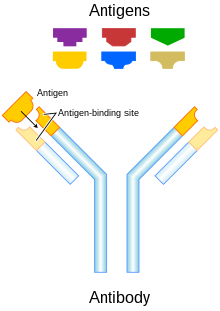Antigen
An antigen is a molecule on the outside of a pathogen (a "germ"). It causes the production of antibodies which stick to the invading virus or bacterium. This is an immune response.[1]

Antigens are usually a protein on the outside of a bacterium or virus. It gets recognized by the adaptive immune system as foreign, and this stimulates the production of antibodies. The antibodies combine with the antigens and make the invading virus or bacterium ineffective. Antigens stimulate the production of antibodies: they do not produce them directly. Vaccines for the seasonal flu virus is a common example.
The body system is normally tolerant of its own molecules, which don't trigger an attack. Autoimmune diseases are caused when this safeguard fails.
The first time that a new antigen comes into contact with the body the response of the immune system will be a complete immune response. During this first response, the antigen will cause antibodies to be made.[2]
The next time the same antigen contacts the body, a full-scale immune response is not needed as the body already has a specific antibody available instantly for that antigen.
Vaccinations usually contain dead bacteria or antigen so the antibodies can recognise it later and make antibodies faster.
Terminology change
- Epitope – the distinct surface features of an antigen.
- Allergen – A substance capable of causing an allergic reaction. The (detrimental) reaction may result after exposure via ingestion, inhalation, injection, or contact with skin.
- Superantigen – A class of antigens that cause non-specific activation of T-cells, resulting in polyclonal T-cell activation and massive cytokine release.
- Tolerogen – A substance that invokes a specific immune non-responsiveness due to its molecular form. If its molecular form is changed, a tolerogen can become an immunogen.
- Immunoglobulin-binding protein – proteins that stick to antigens, for example the B-cell antigen receptor complex.
- T-dependent antigen – Antigens that require the assistance of T cells to induce the formation of specific antibodies.
- T-independent antigen – Antigens that stimulate B cells directly.
- Immunodominant antigens – Antigens that dominate (over all others from a pathogen) in their ability to produce an immune response.[1]
References change
- ↑ 1.0 1.1 "Immune system and disorders". MedlinePlus, US National Institute of Medicine. 28 September 2020. Retrieved 13 October 2020.
- ↑ Janeway C.A et al 2001. Immunobiology, 5th ed, New York: Garland Science. ISBN 978-0-8153-4101-7